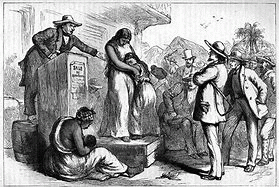Last Wednesday and Thursday were the most theological days I can remember.
It all revolved around the Trump administration's practice of separating children from their immigrant parents, including tearing nursing infants from the breasts of their mothers and the attendant prospect of "baby jails."
To begin with, the Roman Catholic Bishops' Conference condemned such policy as clearly immoral.
Even evangelical Trump supporter, Franklin Graham, called the Trump policy "disgraceful."
In response, Attorney General, Jeff Sessions, offered his best imitation of the "Islamist" theocrats his type loves to vilify. Instead of invoking U.S. law, the Constitution, or legal and historical precedent, the nation's leading law enforcement agent decided to justify Trump policy theologically. He claimed that the apostle Paul would endorse it, since the program comes from government, which Sessions declared enjoys ipso facto divine authority.
Sharia Law, anyone?
More specifically, the AG referenced Romans 13. He said, "I would cite you to the Apostle Paul and his clear and wise command in Romans 13 to obey the laws of the government because God has ordained them for the purpose of order."
The next day, Mr. Trump's press secretary, Sarah Sanders followed suit averring that "It is very biblical to enforce the law."
Such theological debate invites comment.
The first response is that Paul obviously could not have meant that all government legislation reflects the will of God. That would mean not only that the U.S. slave system was divinely approved, but that the decrees of Genghis Kahn, Hitler, and Stalin enjoyed divine approbation.
Even closer to home, the Sessions interpretation of Romans 13 would mean that Jesus himself, Paul, and all the great Christian martyrs -- not to mention religiously-motivated champions of civil disobedience like Martin King and Mohandas Gandhi -- were all condemned by God.
On the contrary, all of them (including Gandhi), drew inspiration from the example of biblical prophets who made a point of disobeying laws which routinely claimed divine origin.
In fact, Jesus' defense for breaking the most inviolable law of his time, the Sabbath Law, was that law's very purpose was to serve human beings. Laws contradicting such humanitarian intent, he implied, have no authority at all.
So, what, then, did Paul mean by his words, "Let everyone be subject to the governing authorities, for there is no authority except that which God has established. The authorities that exist have been established by God"?
Try this:
" Authority means the power or right to give orders, make decisions, and enforce obedience.
" All such power comes from God and God's law.
" Government legislation reflecting God's law must be obeyed.
" Obviously, all other laws must be disobeyed.
" According to Jesus' teachings, God's law is to treat others as you would like to be treated with special care for the poor, widows, orphans, and immigrants.
(Note: You can view every article as one long page if you sign up as an Advocate Member, or higher).






